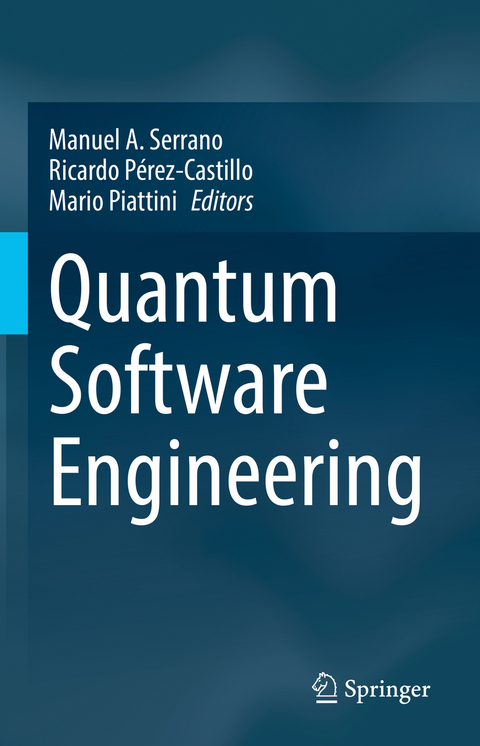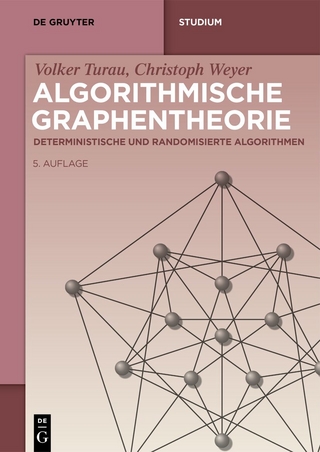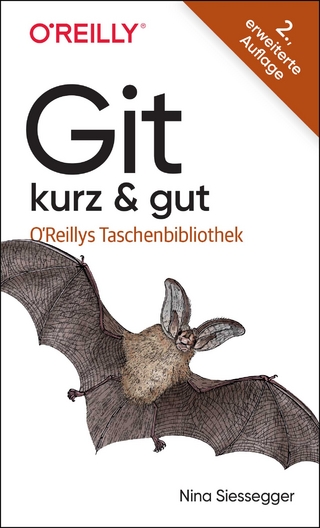
Quantum Software Engineering
Springer International Publishing (Verlag)
978-3-031-05323-8 (ISBN)
This book presents a set of software engineering techniques and tools to improve the productivity and assure the quality in quantum software development. Through the collaboration of the software engineering community with the quantum computing community new architectural paradigms for quantum-enabled computing systems will be anticipated and developed.
The book starts with a chapter that introduces the main concepts and general foundations related to quantum computing. This is followed by a number of chapters dealing with the quantum software engineering methods and techniques. Topics like the Talavera Manifesto for quantum software engineering, frameworks for hybrid systems, formal methods for quantum software engineering, quantum software modelling languages, and reengineering for quantum software are covered in this part. A second set of chapters then deals with quantum software environments and tools, detailing platforms like QuantumPath®, Classiq as well as quantum software frameworks for deep learning.
Overall, the book aims at academic researchers and practitioners involved in the creation of quantum information systems and software platforms. It is assumed that readers have a background in traditional software engineering and information systems.
Manuel A. Serrano is Associate Professor at the University of Castilla - La Mancha (Spain) since 2000. Currently, he is Vice-Dean of the Department of Technologies and Information Systems. He has participated in more than 20 research projects, has conducted several invited speeches and transfer project with companies. Manuel is a member of the aQuantum team working on quantum algorithms, quantum testing and quantum software engineering. He is also part of the Microsoft Quantum Network imparting several quantum computing seminars and workshops. Ricardo Perez-Castillo works at the IT & Social Sciences School of Talavera at University of Castilla-La Mancha and belongs to Alarcos Research Group. His research includes works on architecture-driven modernization, model-driven development, and business process archaeology. Ricardo is member of the aQuantum scientific research team where he works on the migration of classical and quantum systems toward hybrid information systems. He is the research director of some public-funding research projects about quantum software engineering, and he has also co-organized several workshops on Quantum Software Engineering. Mario Piattini is Director of the Alarcos Research Group at UCLM. He is among the 15 "Top scholars in the field of systems and software engineering (2004-2008)" and the 15 "Most active experienced Software Engineering researchers in top-quality journals (2010-2017)". He is the co-creator of the "aQuantum" unit, which was founded to learn about the specific problems quantum developers and scientists have to face, and which puts together industry and research. He has also co-organized several workshops on Quantum Software Engineering.
1 Elías F. Combarro, Quantum Computing Foundations.- 2 Mario Piattini and Juan Manuel Murillo, Quantum software engineering landscape and challenges.- 3 Miguel Ángel Blanco and Manuel Serrano, Quantum Information Technology Governance System.- 4 Benjamin Weder et al., Quantum Software Development Lifecycle.- 5 Carmelo Cartiere, Formal Methods for Quantum Software Engineering.- 6 Carlos A. Pérez-Delgado, A Quantum Software Modeling Language.- 7 Iaakov Exman and Alon Tsalik Shmilovich, Quantum Software Models: Density Matrix for Universal Software Design.- 8 David Valencia et al., Quantum Service Oriented Architectures: from hybrid classical approaches to future standalone solutions.- 9 Antonio García de la Barrera at al., Quantum Software Testing - Current trends & Emerging proposals.- 10 Miguel-Angel Sicilia at al., Quantum software measurement.- 11 Luis Jiménez-Navajas at al., Quantum Software Modernization.- 12 José A. Cruz-Lemus and Manuel Serrano, Quantum software tools overview.-13 Guido Peterssen at al., Quantum software development with QuantumPath®.- 14 Nir Minerbi, Quantum Software Development with Classiq.- 15 Filipa Ramos Ferreir et al., Quantum Software Frameworks for Deep Learning.
| Erscheinungsdatum | 14.10.2022 |
|---|---|
| Zusatzinfo | XXVIII, 302 p. 141 illus., 89 illus. in color. |
| Verlagsort | Cham |
| Sprache | englisch |
| Maße | 155 x 235 mm |
| Gewicht | 655 g |
| Themenwelt | Mathematik / Informatik ► Informatik ► Software Entwicklung |
| Mathematik / Informatik ► Informatik ► Theorie / Studium | |
| Naturwissenschaften ► Physik / Astronomie ► Quantenphysik | |
| Schlagworte | Classiq • Quantum Algorithms • Quantum Computing • QuantumPath® • Scientific Computing • software development • Software engineering • Software Testing |
| ISBN-10 | 3-031-05323-0 / 3031053230 |
| ISBN-13 | 978-3-031-05323-8 / 9783031053238 |
| Zustand | Neuware |
| Informationen gemäß Produktsicherheitsverordnung (GPSR) | |
| Haben Sie eine Frage zum Produkt? |
aus dem Bereich


